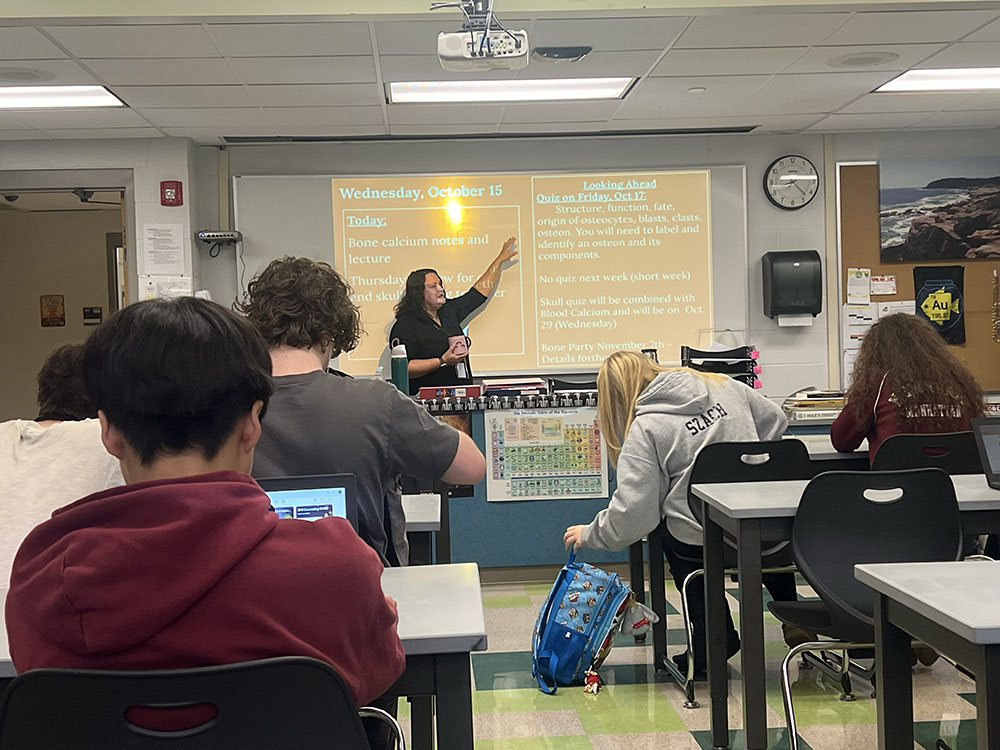In the last two years, Ohio schools have faced uncertainty about the future of teacher evaluation. Both the Republican-controlled Ohio government and the Democratic-run US Dept. of Education have supported plans to evaluate teachers based on student performance. It is likely that BHS students will be affected by this trend, as more pressure will be coming to perform well in classes and on Ohio standardized tests.
In Jan. 2011, Ohio won $400 million from the Obama administration, making it one of 11 states selected for the Race to the Top program. Beachwood is one of many school districts that signed on to the program, receiving a portion of the state’s funds in exchange for reforms. Among other things, Race to the Top requires the use of student test data to assess teachers.
A more dramatic sign of change for Ohio schools came last spring with provisions in Senate Bill 5, the anti-collective bargaining bill supported by Gov. John Kasich. SB 5 attacked public employee unions and eliminated teacher raises based on years of service, replacing them with merit pay. The bill was overturned by Ohio voters in November.
Also last spring, the Ohio House of Representatives passed House Bill 153, a budget bill that included new requirements for education. Since House Bill 153 was passed, the Beachwood School District is now required to tie teacher evaluation to student performance according to the requirements of the federal Race to the Top initiative.
However, there has been no agreement about how to measure student and teacher performance.
The state is already measuring some students’ and teachers’ performance using value added assessment in elementary grades. Using state tests administered at the end of 3rd and 4th grade, the state measures whether students have met expected growth from year to year.
BHS Principal Robert Hardis said, “When I observe a class, I don’t only observe the teacher. I look at the students… If there was merit pay: a minimum of 50% of an evaluation would be based on student performance.” He also explained that the OGT, which will be replaced in two years, is a low standard to measure student performance.
Superintendent Dr. Richard Markwardt stated, “Our district is still unaware as to how we’re going to properly measure student growth. We predict that the state will create a type of assessment that will be taken at each grade level.”
Markwardt went on to say that since our district has always done quite well on standardized tests, the state has always awarded the district the ranking of “excellent” or higher.
Beachwood administrators seem to have mixed feelings about merit pay. “Merit pay is currently not a law, so I’m still unsure of its effects on school districts,” said Hardis. “I have yet to see a proposal for merit pay that is fair or able to [withstand] legal challenge. At this point I do not support it. If I see something that would fairly evaluate our teachers, I may reconsider my opinion.”
Markwardt said, “I’m honestly not opposed to teacher evaluation being based on student performance, but if it is the main basis for judgment, I am not supportive. The state is just trying to legislate objectivity, but I don’t know how they will unless they have a test [to measure student performance].”
Students have expressed their own feelings. “This initiative sounds like it could have negative and positive effects; if a teacher is evaluated poorly it could make the teacher work harder and make sure his or her students are improving,” said Senior Scott Janovitz. “On the negative side, it could be a flawed system. I feel tests don’t measure performance well and that if students begin to goof off, the schools [are more likely to issue severe punishments] as teachers lives now depend on us teenagers.”
“It’s hard to say [what the results will be] if teachers are evaluated by the state; there might be a salary increase or decrease, many circumstances can affect this. Evaluation should only be one component [used to determine teacher compensation]. If student performance is what we base it on, then it is a limited evaluation,” stated Markwardt.
Teachers’ responses to Race to the Top is also crucial to its success. The Beachwood Federation of Teachers has been a part of the Race to the Top initiative since Beachwood applied for the grant two years ago.
The Beachwood Federation of Teachers is hoping to have a voice in the teacher evaluation tool to be implemented for Race to the Top. After overturning Senate Bill 5 this past November, teachers realize that their problems with the Ohio government are not over yet over. The Beachwood Federation of Teachers, or BFT, is forming a committee that will handle Race to the Top. Greg Deegan, a member of the BFT said, “I support the idea in many respects, although for decades the notion has been met with difficulties as it is hard to fully determine merit.”
Deegan also said, “I would argue that making a significant portion of one’s evaluation based on aspects [that are] beyond a teacher’s control can be inaccurate and dangerous.”
Deegan believes that it is hard to determine how his students are going to perform. For his AP students, he believes that some might look to the AP test as an assessment of his merit, and when students don’t come in for review or don’t put in the extra effort, their performance may not fully reflect his quality of teaching.
As our school district enters this new era, many questions about teacher evaluation and the Race to the Top initiative are left unanswered. Uncertainty will continue to loom as our district awaits the arrival of new rules from the Ohio Board of Education in Columbus.















![“My parents have always said that education is important. My parents are Chinese immigrants, I'm Chinese American, [and that's a] value that has always been ingrained in our community,” said Senior Lyndia Zheng, pictured with Tony Zheng](https://bcomber.org/wp-content/uploads/2025/10/DSC_4244.jpg)